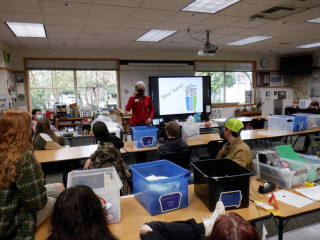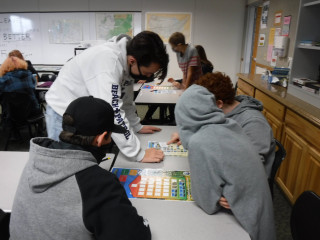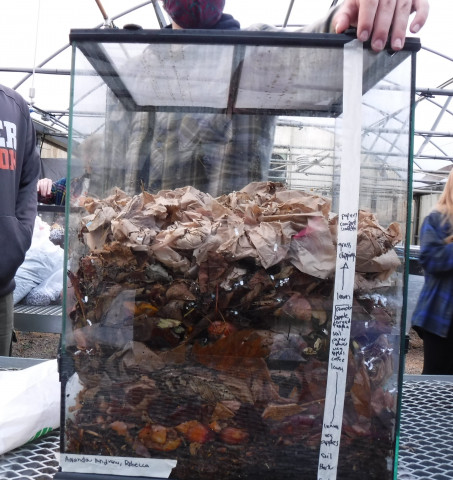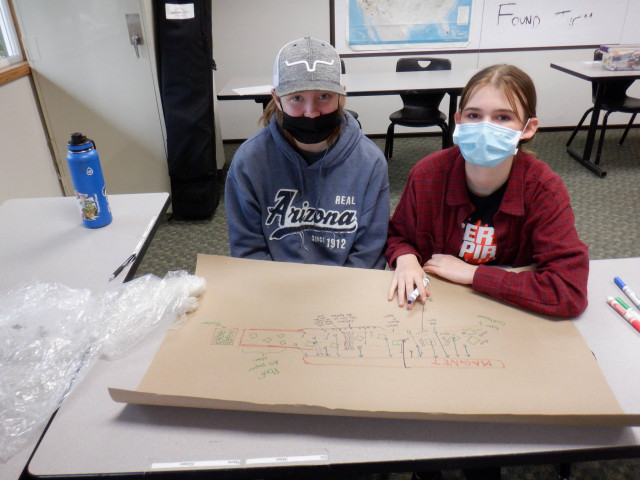Clark County Green News
No-Waste November: CASEE Embarks on an Annual Waste Reduction Journey
Each November, educators, staff, and students at Battle Ground Public Schools' Center for Agriculture, Science, and Environmental Education (CASEE) set out on a month-long exploration into the principles of waste reduction. Since 2019, CASEE has used No-Waste November to engage students in a range of sustainability projects in an effort to demonstrate the impact that our actions have on the environment, and how we can reduce that impact.
The month kicks off with a visit from Waste Connections educator Ellen Ives, who leads students through three different waste reduction lessons. First, in "The Journey of Waste", students learn how much garbage Clark County produces and where it goes. They brainstorm ways to reduce garbage, learn how the recycle system works, and what is actually recyclable. Then, they practice sorting mixed waste into categories: reuse, recycle, compost, or garbage. The next activity is "Consumption Consequences", a game in which students "buy" items and take the natural resources from the land needed to make them. As they play, it quickly becomes evident how easily resources become depleted, and they are encouraged to explore other options. Finally, in "Sort System Design", students design changes to the current recycle system in Clark County that would enable it to sort more recyclable items that it currently cannot. These fun, interactive lessons provide students with a foundational knowledge of the waste system and gets them thinking about more environmentally conscious alternatives to our prevailing habits.
After this introduction, CASEE students begin implementing a set of hands-on approaches to reducing waste across their campus. Classes engage in a friendly competition to see who can achieve the least amount of contamination in their recycling as well as the least amount of recyclables in the garbage. Students conduct spot checks on other classrooms and record on a sheet how much contamination they find. Each material comes with a point value, and the goal for each class is to avoid accumulating points. If a student found a can or bottle, for example, in the garbage, when it could alternatively be recycled, that classroom would receive 20 points. At the end of the month, the classroom with the least amount of points wins a specially crafted recycled trophy.
In addition, the Senior class (who now has participated in No-Waste November since its inception) has created see-through compost bins out of aquariums to study. In week one, the Seniors began by adding different layers of organic materials, such as leaves collected by the district grounds crew, apples, coffee grounds, paper shreds, and more, to their see-through bins. Throughout the month, they will monitor their bins as these materials decompose and become compost. One way they track their compost's progress is by taking its temperature. The process of aerobic decomposition, in which microorganisms break down organic matter, generates heat and allows students to gauge how far along their compost bin is in the decomposition process by measuring its temperature.
Finally, for their Thanksgiving celebration, CASEE students learn how to make some useful items for the holiday season out of reusable materials. They sew fabric gift bags from leftover fabric scraps or old clothes, transform used butcher paper into wrapping paper, and make several other homemade crafts.
In order to offer students new insights into waste reduction and the science behind sustainability, CASEE's No-Waste November is continuously evolving. The school's program facilitator, Margaret Bessert, hopes to invite guest speakers from Battle Ground School District and Sodexo (the district's nutrition services provider) to talk about the district's recycle program and food waste, respectively. Jessica Molskness, CASEE's Biology and BioTech instructor as well as the lead on No-Waste November, would like to continue their composting efforts, such as using compost from previous years to plant seedlings which students could then take home. She is also interested in exploring more ways to incentivize students "to curb their consumption of single use items" by giving them points for bringing a reusable cup, thermos, or water bottle, for example.
No-Waste November has proven to be an energizing and impactful project for both teachers and students at CASEE. Ms. Molskness says that No-Waste November allows students to "see that their actions can make a difference." It gives them a strong understanding of the fundamentals of waste reduction, which they take "and apply to things they do every day." She also enjoys "how students begin to think before they throw anything in the garbage, and the discussions that come with it. In addition, it is fun to see students so excited to catch other students making mistakes. They'll reach into the garbage and recycle bins to pull out paper or a can to dispose of it correctly, when before, they wouldn't have bothered."
Congratulations to the CASEE community for leading another successful month of No-Waste November - a project that perfectly fulfills the school's vision of "inspiring a culture of awareness and stewardship in the world."
When you subscribe to the blog, we will send you an e-mail when there are new updates on the site so you wouldn't miss them.







